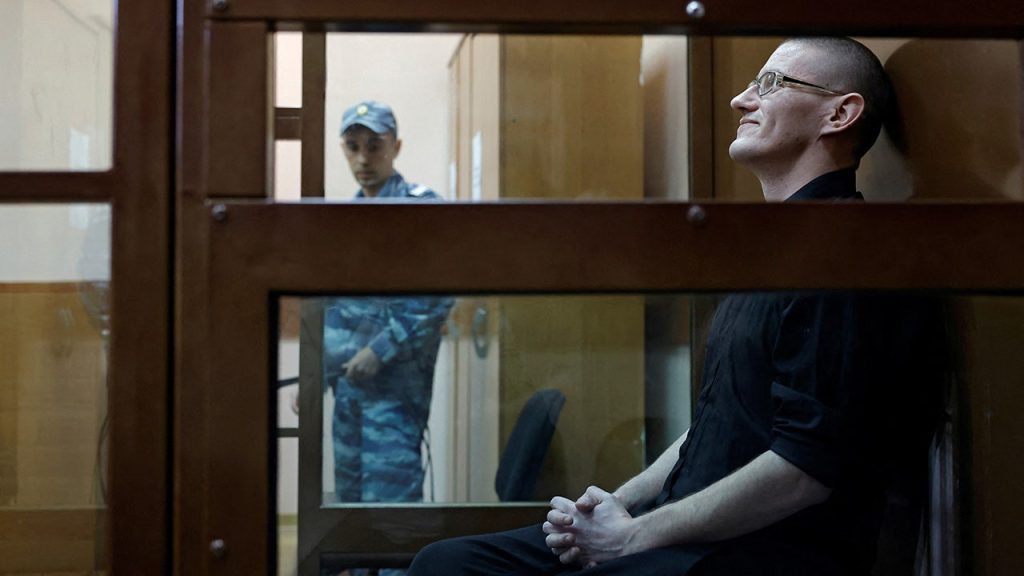A Russian court has reduced the sentence of American citizen Robert Woodland, who was convicted on drug trafficking charges, from 12.5 years to 9.5 years. This decision was communicated by his attorney, Stanislav Kshevitsky, to international news agencies. Though the motivation behind the shortening of Woodland’s sentence remains unclear, U.S. State Department officials indicate they are closely monitoring the situation and the welfare of American citizens overseas remains a top priority for them.
| Article Subheadings |
|---|
| 1) Background on Robert Woodland’s Arrest |
| 2) Legal Proceedings and Recent Developments |
| 3) U.S. Government Involvement |
| 4) Comparisons to Other U.S. Prisoners in Russia |
| 5) Implications of Woodland’s Case |
Background on Robert Woodland’s Arrest
The circumstances surrounding the arrest of Robert Woodland, born in Russia in 1991, became a focal point in international discussions about justice and human rights. Woodland was adopted by American parents at the age of two and returned to Russia at 26 to reconnect with his biological mother. However, his visit took a dire turn when he was arrested in January 2024. Authorities reported that Woodland was found in possession of 50 grams of mephedrone and accused him of attempting to sell drugs. This prompted a swift legal process, culminating in a conviction for drug trafficking in July 2024.
Legal Proceedings and Recent Developments
Woodland’s case has manifested in a legal saga characterized by its complexities and the significant emotional toll on him and his family. His original sentence of 12.5 years was seemingly met with various appeals, leading to the recent decision to reduce it by three years, announced by a Russian court on a Tuesday. Stanislav Kshevitsky, Woodland’s attorney, expressed surprise at the court’s decision but did not delineate the distinct factors that contributed to the shortened sentence. With ongoing discussions in legal circles regarding the fairness of the penal system in Russia, Woodland’s case highlights the difficulties foreigners face when entangled in the Russian legal system.
U.S. Government Involvement
The U.S. Government has been actively engaged in the situation regarding Woodland’s detention. Officials from the State Department have been monitoring the case closely and reiterated their commitment to ensuring the safety and security of Americans abroad. A spokesperson indicated that the well-being of American detainees remains a high priority and that they have a range of tools at their disposal to assist citizens facing legal issues overseas. While specific actions taken in response to Woodland’s case have not been disclosed, the government’s involvement illustrates the challenges faced in securing the release of detainees in foreign jurisdictions.
Comparisons to Other U.S. Prisoners in Russia
Robert Woodland is not the only American citizen whose fate has sparked international scrutiny. Other high-profile cases, such as those of Ksenia Karelina and Marc Fogel, highlight the complexities of U.S.-Russia relations concerning detained Americans. Karelina, a Russian-American ballerina, was previously imprisoned for treason after she contributed a nominal amount to a Ukrainian charity, reflecting the broad and stringent interpretations of law in Russia. Unlike Woodland, she was released as part of a prisoner exchange deal earlier this month. In contrast, Marc Fogel, an American history teacher, was detained for almost two years before his release and return to the U.S., illustrating variances in outcomes for Americans seeking justice in Russia.
Implications of Woodland’s Case
The implications of Robert Woodland‘s case extend beyond individual circumstances, illustrating a growing concern about the judiciary’s handling of foreign detainees in Russia. The reduction of his sentence may signal some flexibility within the system, but it also raises questions about the underlying political motivations. Many observers are watching for potential shifts in U.S. foreign policy as these high-profile cases unfold, particularly amid calls for greater transparency and human rights considerations. Furthermore, Woodland’s ongoing imprisonment serves as a grim reminder of the risks that American citizens face when navigating foreign laws and customs.
| No. | Key Points |
|---|---|
| 1 | Robert Woodland’s sentence was reduced from 12.5 years to 9.5 years by a Russian court. |
| 2 | Woodland was convicted of drug trafficking after being found with 50 grams of mephedrone. |
| 3 | The U.S. State Department is closely monitoring Woodland’s case, emphasizing the welfare of Americans abroad. |
| 4 | Woodland’s situation raises questions about the treatment of foreigners within the Russian legal system. |
| 5 | The case is part of a broader narrative involving other detained Americans in Russia, highlighting U.S.-Russia relations. |
Summary
The case of Robert Woodland underscores significant issues relating to the treatment of American citizens sentenced overseas, particularly in Russia, where legal interpretations can vary widely. The retrospective of his legal troubles and sentence reduction illustrates a complex interplay between foreign law and the diplomatic capacity of the U.S. government. As both his and other high-profile cases progress, their outcomes could have lasting impacts on the nature of U.S.-Russian relations and the manner in which international detainees are managed.
Frequently Asked Questions
Question: What charges was Robert Woodland convicted of?
Robert Woodland was convicted on charges of drug trafficking after being found in possession of 50 grams of mephedrone in Russia.
Question: How has the U.S. government responded to Woodland’s case?
The U.S. State Department has been actively monitoring Woodland’s situation, prioritizing the safety and security of American citizens detained overseas.
Question: How does Woodland’s case compare to other U.S. citizens detained in Russia?
Woodland’s case echoes others like those of Ksenia Karelina and Marc Fogel, who have faced varying degrees of legal outcomes, showcasing the complexities of justice for foreigners in Russia.


